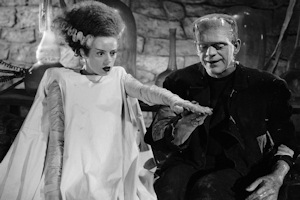Bishop of Manchester to open unique film series
04 Mar 2015
The Bishop of Manchester will open The University’s Playing God Film Series on Thursday 5 March. This unique film series, which is the first of its kind, will focus on the roles of science and religion in movies.

Organised by The University of Manchester’s Science and Entertainment Lab and funded by the Wellcome Trust, The Playing God Film Series offers free screenings with an expert speaker providing a brief introduction before the film and then leading a post-screening discussion with the audience.
The films range from the 1935 cinema classic The Bride of Frankenstein to the original Planet of the Apes, The Exorcist and the 2009 film Creation.
All six films will be screened at the International Anthony Burgess Foundation in Manchester city centre, pre-booking is not required.
The films are:
5th March at 18:30: The Bride of Frankenstein, with an introduction by the science studies scholar Dr David A Kirby from The University of Manchester.
He says: “The Bride of Frankenstein ran into serious censorship difficulties in Hollywood due to the notion of scientists creating humans in a lab. In the original script the scientists compare themselves to God and in 1935 this was considered blasphemous. A lot of changes had to be made before it could be released but it remains a classic horror film which is superior to the original Frankenstein in many ways."
19th March at 18:30: The Exorcist, with an introduction by film scholar Professor Mark Jancovich from The University of East Anglia.
Professor Jancovich will concentrate on the way science is incorporated into The Exorcist. It is traditionally a film that has focused on religious rite but the film also features science in a number of ways, including the crisis of faith suffered by Father Damien Karras.
16th April at 18:30: Planet of the Apes, with an introduction by science fiction expert Dr Amy C Chambers from The University of Manchester.
She says: “The film portrays the apes as living in a very different world to the futuristic setting in the original book. One of the reasons for the change is that religion has stunted innovation. There is a complex religious narrative in this science fiction film which audiences may not have previously considered.”
30th April at 18:00: Solaris, with an introduction by filmmaker Sean Martin
Sean will look at the philosophical and theological issues contained in this reflexive and pensive film from the Soviet Union. It focusses on the mutual confusion suffered on both sides when a planet tries to communicate with astronauts. The film also demonstrates how different nationalities reflect the future.
14th May at 18:30: Creation, with an introduction by theologian Professor Peter Scott from The University of Manchester and historian Professor Joe Cain from University College London.
Professor Scott says: “One way of reading the film is to say that in the end the imperative to publish on evolution overrides religious scruples. Another reading suggests that evolutionary science and Christian piety are not opposed. The second reading strikes me as being more interesting and leaves open the question as to whether theology might have something to contribute to the reception of evolutionary theory.”
21st May: at 18:30 Altered States, with an introduction by historian Dr William R Macauley from The University of Manchester.
He says: “Altered States is about a 'maverick' scientist investigating the link between schizophrenia and religious experience. In the film he uses a sensory deprivation tank, which is interesting as these had been used in genuine scientific experiments in the United States since the early 1950s.”
For more information please visit www.thescienceandentertainmentlab.com
